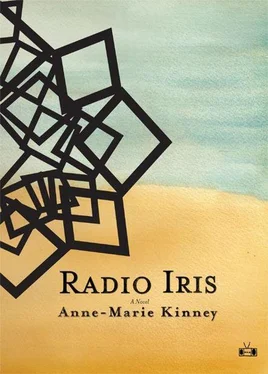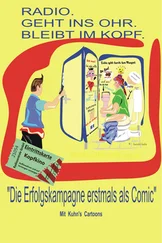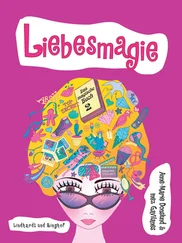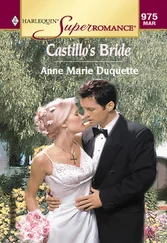“Wait,” he says, pausing in front of her desk. “Don’t turn off the lights.”
“Okay.”
He looks into her eyes, lowering his chin, as though waiting for her to say something else to assure him that she has understood. She keeps nodding.
“I’ll know if you turn them off. If I come back and find them off, then I’ll know.”
“Right. Of course.” Iris folds up the check into a small rectangle and tucks it into the barely functional front pocket of her skirt.
“Good,” he says, halfway out the door, “good,” and he’s gone. She rushes to the window and watches as he hurriedly climbs into his convertible and drives away. She pulls the check out of her pocket and smoothes it, returning to her desk to slip it into her wallet.
Alone in the office now, Iris opens the door to the darkened storage room. She kneels down to peer through the hole in the wall, and is met by a wash of whiteness. It takes her a moment to perceive the texture of fabric, and another to realize that she is looking at a shirt. She pulls her face back. His breath— if it is his breath— moves the fabric ever so slightly in and out, against his skin, against the wall, and there is nothing else to see. He is blocking whatever else might be happening. She brings her ear to the hole, hoping to hear his breath, but no luck. She brings her mouth to the hole and breathes, and wonders if he feels a draft.
“Hello?” she tries.
No answer comes.
She tries again, louder: “Hello?”
Nothing.
It occurs to her that if she were to push her finger through the hole, supposing her finger was long enough, she might find the shirt empty, hung as a decoy, the man having escaped to some hidden room, one she has not yet managed to penetrate. This thought stops her. There is no end to what she doesn’t know. If she were to fashion a hook and catch hold of the shirt, yank it down, another could be hanging just behind it, out of her reach, a self-regenerating series of veils.
Then there is a rumble of motion on the other side of the wall, and her view is suddenly unblocked. She looks into the empty room, lavender carpet, white walls and nothing else. Sun filters in through the shadeless window. But there is no sign of him.
“Hello?”
After a long silence, from somewhere, a voice, his voice, quietly says, “Please…”
“Please what?”
“Please… don’t.”
“Don’t what? I can barely hear you.”
“Please, don’t worry.”
“What?”
And he doesn’t answer. She stares through the hole for a while longer, but nothing else happens.
Iris gets up and pulls a blank sheet of paper from a package by the door and brings it back to her desk.
With her Sharpie, she writes on three lines:
Please don’t go yet.
My name is Iris.
I want to talk to you.
Her hand shakes as she writes the third line, and then, hovering over the paper, the marker in her hand suspended a centimeter above the page, she quickly writes out her phone number, and then blows on it to dry the ink. When she runs her fingers over the words and they don’t smudge, she rolls the paper into a tight baton and goes back to the storage room, dampening the note slightly with her sweating palm. She kneels down, and watching her hands closely, pushes the paper through the hole. She thinks she hears it land against the carpet, and waits for a moment for a possible retrieval, but none comes. She stays kneeled there for a little longer, listening for anything. Finally, her knees cramping, the skin pressed painfully against the floor, she leaves the room and closes the door behind her, squeezing the metal handle, hot in her fist.
I’d better go, she thinks, I’d better get out of here.
On her way out, lights, appliances, and computer on, she begins setting the burglar alarm, but stops and presses the green button to erase what she’s punched in. If she is following a pattern, then it makes sense to leave the alarm off. What is supposed to be off is on, so what is supposed to be on should remain off. This balance needs to be maintained or the pattern falters, and without the pattern, there is nothing to follow. She steps out, almost leaving the door unlocked, but this last habit, she can’t break. She stabs her key in the hole and gives it a grinding turn, then tries the doorknob a few times, unconvinced of her ability to do anything and have it be done.
On the way home, she pulls into the bank to deposit her check. There’s a sign on the ATM outside that says it’s out of service, so she steps inside the bank for the first time in possibly years. The music floating down from the overhead speakers is subtle, a completely ignorable slip of violin, and the air is goosebump cold. Iris fills out a deposit slip, endorses the check, and tucks both into an envelope, which she slides into a deposit kiosk.
The floor, walls, and glass partitions of the bank are sparkling clean, like the whole thing was carved out of liquid. But on the way to the exit, Iris spies a ceiling fan overhead, turning very slowly, and heavy with dust. Each edge of the fan is lined with a thick layer of gray muck. The fan groans a little with each turn. Who knows how thick it is on top, out of sight. She thinks about how dirty the air must be to have this effect. They are all breathing in this dust every second of every day. She can feel it, the filth sticking to the walls of her lungs. Noting the suggestion box by the door, Iris grabs another deposit slip and writes on the back with her Sharpie:
Don’t forget about what’s in the air.
She drops it in the box and steps outside, the late breakfast and early lunch crowds beginning to fill the streets. She gets back into her car and is no longer one of them. She is sealed off from the day out there. She starts the car and Tommy James is singing crimson and clover, over and over with that sonic tremble effect, and in her head, the sun dims and brightens in time.
In a towel, with a toothbrush hanging out the side of his mouth, Neil stands at his dresser tossing rolled socks across the room into an open suitcase on the unmade bed. If there’s anything more fun than packing, he doesn’t know what it is. He throws in one more pair of socks and then steps into the bathroom, swishing the toothpaste water in his puffed cheeks for a few seconds before spitting into the sink. He clicks his tongue, his mouth fresh and icy.
Next he moves onto clothes, weighing different outfits in his head, the gray suit, the navy blue suit, the black pants without pleats, the ones with pleats, ties steel gray, maroon, and marigold. He lays them all in the suitcase so he has plenty of options, throwing in a lint roller in the outside pocket, nail clippers, razor, comb, trench coat because the weather is unpredictable everywhere you go, better bring an umbrella too, and can’t forget underwear, boxers, briefs, and boxer briefs, because you never know what your body’s going to feel like wearing when you wake up. He pauses to vigorously towel dry his hair and the phone rings. He grabs it off the dresser and answers without looking to see who it is.
“This is Finch.”
“Finch, Mason. You got a sec?”
“Uh, just a sec. I’m packing.”
“Right. Listen, I just wanted to talk to you about the meeting with Creationeers.”
“Yeah?”
“Nothing to be too concerned about, I just thought you should know so you could keep it in mind for future reference.”
“What is it?”
“Obviously you know we didn’t close the account.”
“Yeah…” Neil sits down on the bed.
“Well, I had a talk with Krebs to see if I could change his mind, and he… shared his impressions. Of you.”
Читать дальше












